人教版2025中考英语一轮复习九年级 Units 3-4 课件 (共54张PPT)
文档属性
| 名称 | 人教版2025中考英语一轮复习九年级 Units 3-4 课件 (共54张PPT) |

|
|
| 格式 | pptx | ||
| 文件大小 | 87.4MB | ||
| 资源类型 | 教案 | ||
| 版本资源 | 人教新目标(Go for it)版 | ||
| 科目 | 英语 | ||
| 更新时间 | 2025-03-25 19:18:27 | ||
图片预览

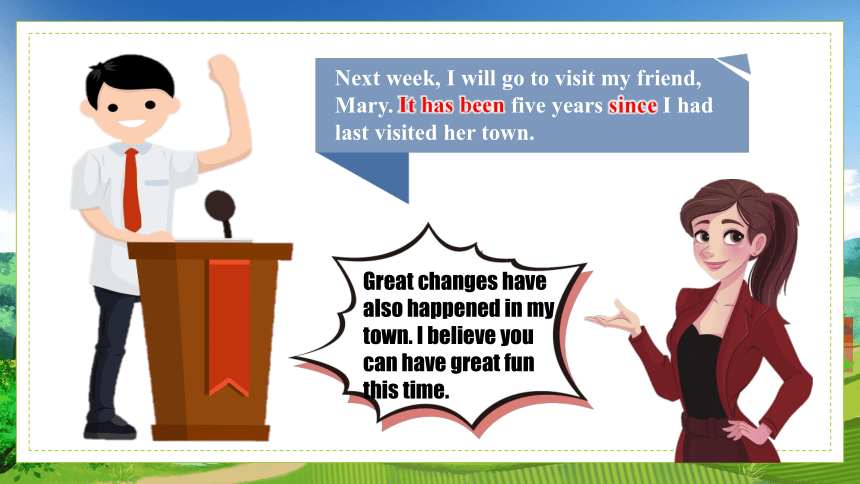
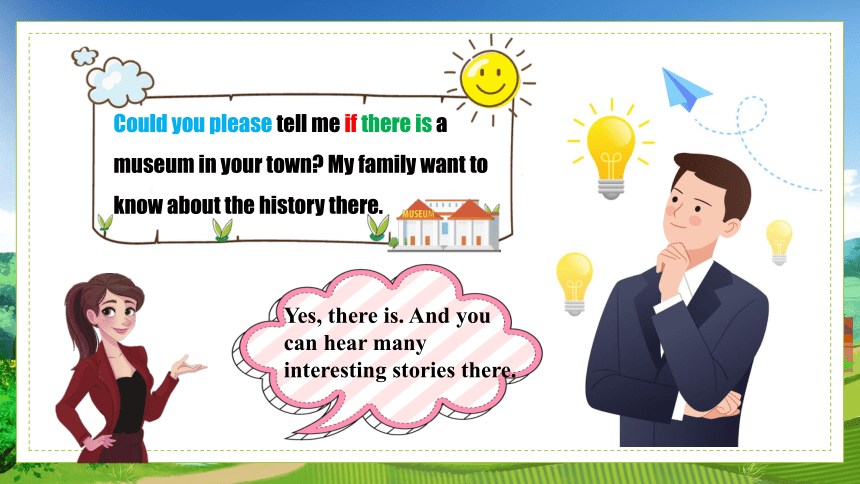


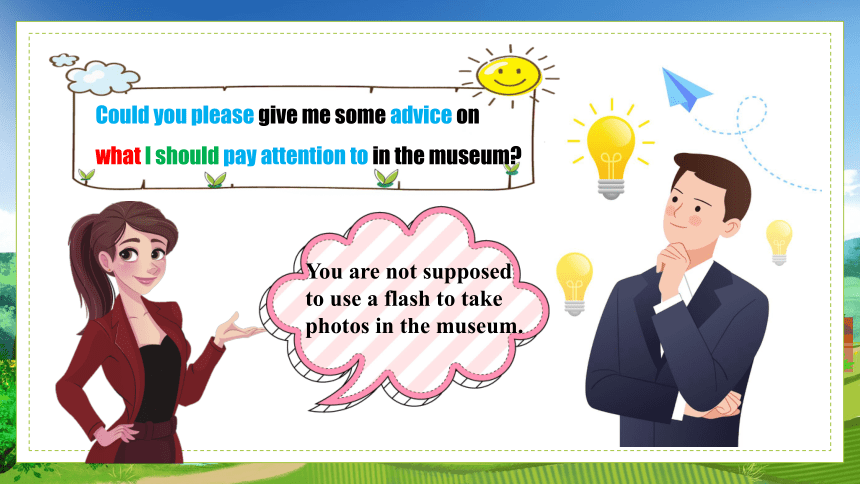
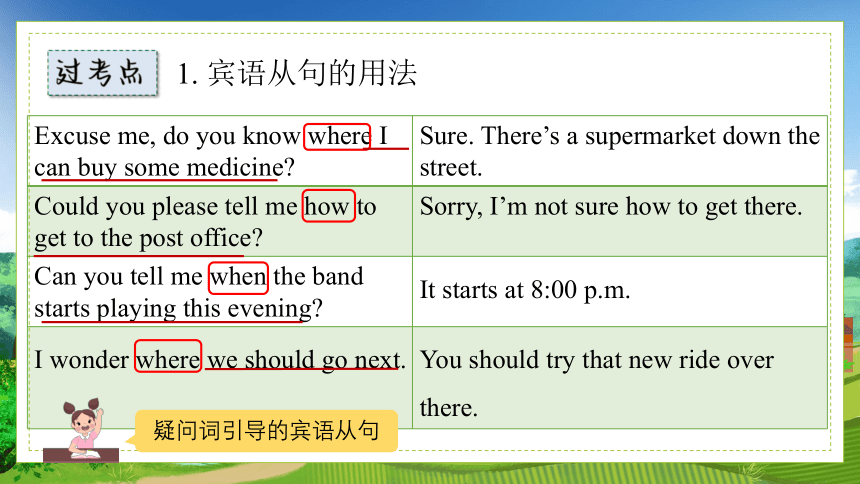
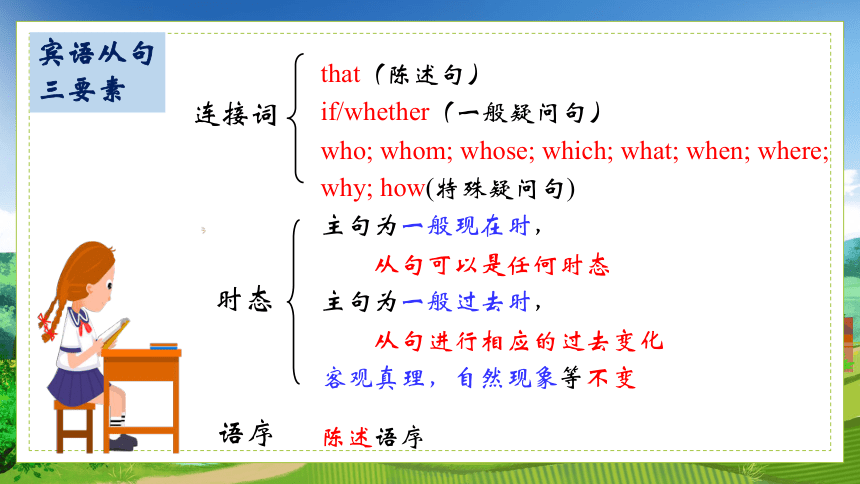
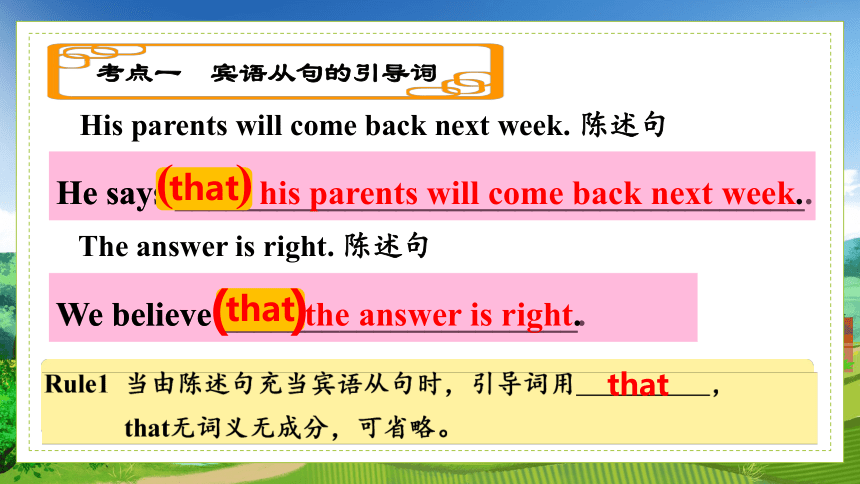

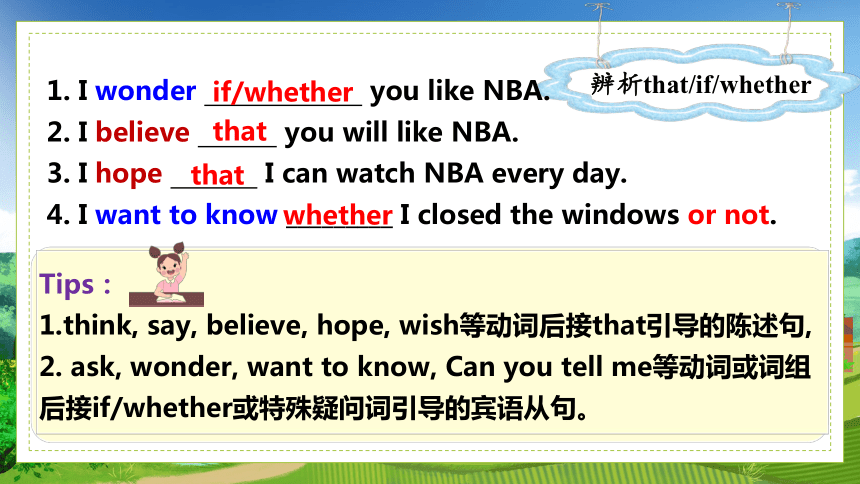

文档简介
(共54张PPT)
Next week, I will go to visit my friend, Mary. It has been five years since I had last visited her town.
Great changes have also happened in my town. I believe you can have great fun this time.
Yes, there is. And you can hear many interesting stories there.
Could you please tell me if there is a museum in your town My family want to know about the history there.
Could you please tell me where the museum is
Sure. It’s on the Center Street. And you can find it across from the police office.
Could you please tell me when it is open on weekdays
It’s open from 8:00am-11:30am and 2:00-5:30pm on weekdays.
Could you please give me some advice on what I should pay attention to in the museum
You are not supposed to use a flash to take photos in the museum.
1. 宾语从句的用法
Excuse me, do you know where I can buy some medicine Sure. There’s a supermarket down the street.
Could you please tell me how to get to the post office Sorry, I’m not sure how to get there.
Can you tell me when the band starts playing this evening It starts at 8:00 p.m.
I wonder where we should go next. You should try that new ride over there.
疑问词引导的宾语从句
that(陈述句)
if/whether(一般疑问句)
who; whom; whose; which; what; when; where; why; how(特殊疑问句)
主句为一般现在时,
从句可以是任何时态
主句为一般过去时,
从句进行相应的过去变化
客观真理,自然现象等不变
陈述语序
连接词
时态
语序
宾语从句三要素
He says _____________________________________.
考点一 宾语从句的引导词
Rule1 当由陈述句充当宾语从句时,引导词用 ,
that无词义无成分,可省略。
that
He says that his parents will come back next week.
His parents will come back next week. 陈述句
We believe _____________________.
The answer is right. 陈述句
that
( )
We believe that the answer is right.
that
( )
Will it rain tomorrow
Tom wonders ____________________________________________.
whether it will rain tomorrow or not
I don’t know________________________________________________.
if your brother like watching NBA
Rule2 从句为一般疑问句,用 引导,意为”是否” 不可省略。
if/whether
注意:从句后有or或or not时,只用whether。
Does your brother like watching NBA
辨析that/if/whether
1. I wonder you like NBA.
2. I believe you will like NBA.
3. I hope I can watch NBA every day.
4. I want to know _________ I closed the windows or not.
if/whether
that
that
whether
Tips:
1.think, say, believe, hope, wish等动词后接that引导的陈述句,
2. ask, wonder, want to know, Can you tell me等动词或词组后接if/whether或特殊疑问词引导的宾语从句。
Tina doesn’t know .
She wonders .
Rule3 从句为特殊疑问句,引导词用原来的 ;
如:who, why, how, where, when等。
特殊疑问词
how to find it.
Tips:主句和从句的主语一样时,宾语从句可以用疑问词+to do 替换
=
where her new schoolbag is
how she can find it
how she can find it
Where is my new schoolbag
How can I find it
My father asks me if I closed the windows just now.
I hear that Tom will come tomorrow.
Our teacher says it is important to learn English well.
Rule 1:当主句是一般现在时,从句的时态 ___________________。
根据实际情况而定
考点二 时态
My teacher asked me if I had finished my homework.
He wondered if I could help him.
He told me that he was born in 1996.
Rule 2:当主句是一般过去时,从句通常也用相应的 _____________。
过去时态
My teacher tells me that light travels faster sound.
Our teacher told us that the earth goes round the sun.
Rule3: 当从句是客观真理或事实时,从句只能用 。
一般现在时
(1)当宾语从句是特殊疑问句时,疑问词就是宾语从句的引导词。连接代词who,whom,whose,which,what和连接副词where,how,why,when可引导宾语从句,并在从句中作一定成分。
疑问词引导的宾语从句
Where can I buy some medicine
Excuse me, do you know where I can buy some medicine
How to get to the post office
Could you please tell me how to get to the post office
Observe the structures of the following sentences. What are the differences
(2)在含有宾语从句的复合句中,宾语从句要用陈述语序。因此当特殊疑问句作宾语从句时,一定要注意语序。
“Where did he go last month ” She asked. = She asked where he went last month.
当疑问代词what/who在特殊疑问句中作主语时,该特殊疑问句本身即是陈述语序,所以转变成宾语从句后无需再调整语序。
“What’s wrong with the TV ” Tom asks. = Tom asks what’s wrong with the TV.
语序的变化
宾语从句可转化成“疑问词+动词不定式”结构
(3)宾语从句可转化成“疑问词+动词不定式”结构。
在含有疑问词引导的宾语从句的主从复合句中,如果从句的主语与主句的主语或宾语一致,则宾语从句可以转化为“疑问词 + 动词不定式”结构。
I want to know how I get there.
→ I want to know how to get there.
1. It is(has been)+时间段+since从句
“It is(has been)+时间段+since从句”与“时间段+has passed+since从句”可以互换,表示“自从……以来已经有多长时间了”。since后面的从句多用短暂性动词,通常用一般过去时。这两种句型可与相应的一般过去时态的句子进行转换。此外,部分短暂性动词可以转化为相应的延续性动词或表状态的be+名词/形容词/副词/介词短语等,与这两种句型构成同义词。
如:“他死了两年了。”有如下表达方式:
①It is(has been) two years since he died.
②Two years has passed since he died.
③He died two years ago.
④He has been dead for two years/since two years ago.
1. It is(has been)+时间段+since从句
1. It has _____ (be) 10 years since the park _________(build).
2. 我到这儿已经一周了。
__________________________________________
3. It has been three months since he left his home.(改为同义句)
① ______________________________ he left his home.
②He ____________________ his home for three months.
4. —Wow, I’m so glad to see you again, Linda. It has been a long time ______ we met last time. You don’t know how much I miss you.
—Me, too.
been
was built
It has been a week since I arrived here.
Three months has passed since
has been away from
since
1. advise/suggest的用法
单词 名词形式 常见用法
advise advice (不可数) ①advise sb. to do sth.
②advise doing sth.
③advise + that从句【虚拟语气:(should + 动词原形)】
suggest suggestion (可数) ①suggest sth. (to sb.)
②suggest (sb.) doing sth.
③suggest + that从句【虚拟语气:(should + 动词原形)】
注意:表示“一条建议”,用a piece of advice或a suggestion
Dr, Zhong gave us much on how to protect ourselves from the virus.
A. idea B. suggestion C. advice
C
根据上下文提示补全短文内容
For this month's Young World magazine, I 1. ___________(interview) 19-year-old Asian pop star Candy Wang. Candy told me that she used to be really shy and took up singing to deal with her shyness. As she got better, she dared to sing in front of 2.________(she) class, and then for the whole school. Now she's not shy anymore and loves singing in front of 3. ___________(crowd).
I asked Candy 4. ______ life was different after she became famous. She explained that there are many good things, like being able to travel and meet new people all the time. "I didn't use to be popular in school, but now I get tons of attention everywhere I go." However, too 5. _______(many) attention can also be a
interviewed
her
crowds
how
much
根据上下文提示补全短文内容
bad thing. "I always have to worry about how I appear to others and I have to be very 6._________(care) about what I say or do. And I don't have much private time anymore. 7.________(hang) out with friends is almost impossible for me now because there are always guards around me."
What does Candy have to say to all those young people who want to become famous "Well," she begins slowly, "you have to be prepared to give up your normal life. You can never imagine how difficult the road 8. __________(success) is. Many times I thought about giving up, 9. ______ I fought on. You really require a lot of talent and hard work to succeed. Only 10. ___ very small number of people make it to the top."
careful
Hanging
to success
but
a
With the continuous advancement of urbanization, people pay more and more attention to the construction and development of rural areas.
And great changes happened in my village as well. I’m so proud of it.
The houses in my village used to be dilapidated.
But now, there are many beautiful high buildings.
We used to see rubbish everywhere in my village.
But now, the whole village is clean and tidy.
There used to be a few schools in the village.
But now, the government helps set up many schools for students in the village.
Students used to go to school by climbing over the mountain.
But now, all the roads in the countryside are made of cement.
There didn’t used to be any park for amusement.
But now, the government sets up parks for the old to practice.
People are required to think of more ways to deal with some of the problems.
I used to be short
Paula used to be really quiet.
You used to be short, didn’t you
Did he use to wear glasses
I didn’t use to be popular in school.
She didn’t use to like tests.
Yes, I did./No, I didn’t.
Yes, he did./No, he didn’t.
肯定:主+used to+动原
否定:主+didn’t use to+动原
1.used to do的用法
1.used to do的用法
used to
used to是一个固定结构,它的意思是“过去经常、
以前常常”,它的后面用动词原形,它表示过去存在某
种状态或者过去的某种经常性、习惯性的行为或者动,
并意味着这种动作目前已经不存在,所以它只能用一般过
去时,不能用现在时态。并且没有人称和数的变化。
意义
1.used to do的用法
否定:主+didn’t use to/used not+动原
eg:她过去不留长发。
She didn’t use to have long hair.
=She usedn’t to have long hair.
迈克过去不努力学习。
Mike used not to study hard.
=Mike didn’t use to study hard.
1.used to do的用法
I used to be short
Paula used to be really quiet.
You used to be short, didn’t you
Did he use to wear glasses
I didn’t use to be popular in school.
She didn’t use to like tests.
Yes, I did./No, I didn’t.
Yes, he did./No, he didn’t.
一般疑问句:Did+主+use to+动原
肯定回答:Yes, 主 + did. 否定回答:No, 主+ didn’t.
反义疑问句:主 +used to+动原, didn’t +主
主 + didn’t use to+动原, did +主
回答根据实际情况
1.used to do的用法
其特点是“前肯后否”或“前否后肯”
e.g. Your brother used to have noodles for breakfast, didn’t he
你哥哥过去早餐常吃面条, 不是吗?
——He used to be fat,_______ _____
——Yes,he did.(是,他胖)
didn’t
he
No, he didn’t.(不,他不胖)
反义疑问句:主 +used to+动原, didn’t +主
主 + didn’t use to+动原, did +主
回答根据实际情况
1.used to do的用法
一般疑问句:Did+主+use to+动原
肯定回答:Yes, 主 + did. 否定回答:No, 主+ didn’t.
Did+主语+use to+动词原形+其它?
Used+主语+to+动词原形+其它?
答语:Yes, sb. did/used.
No, sb. didn’t/usedn’t.
eg:你过去常弹钢琴吗?
Did you use to play the piano
=Used you to play the piano
Yes, I did/used.
No, I didn’t/usedn’t.
1.used to do的用法
辨析
1、used to do 过去常常做某事(只用于过去时态)
3、be used to doing 习惯于做某事(可用于现在、过去、将来等多种时态)
e.g. Did he use to wear glasses
他以前戴眼镜吗?
This knife is used to cut fruit.
这把刀被用来切水果。
My dad is used to getting up early every day.
我父亲习惯每天早起。
2、be used to do 被用来做某事(是被动语态, 不定式表示目的, 用于多种时态)
1.辨析deal with与do with
两者都有“处理”的意思,具体区别如下:
短语 用法 例句
deal with 常与how连用,意为“解决;处理;应对; 应付”,强调处理问题的方式、方法
I don’t know how to deal with the problem.
我不知道如何处理这个问题。
do with 常与what连用,意为“处置;处理;对 待”,侧重于“处理”的对象
What have you done with the old books
你怎样处理这些旧书的
1.辨析deal with与do with
1. 你能告诉我你打算如何处理你的旧衣服吗?
____________________________________________________
I wonder what you’ve __________ my bike.
According to a survey, students’ safety has become
a big problem. Many students are hurt or killed in different kinds of accidents. Here is some advice for young students on how to _________danger.
Could you tell me how you will deal with your old clothes
done with
deal with
1. require的用法
require意为“需要;要求”,常见用法如下:
1. require的用法
1. We all know that learning a foreign language ________ time and effort.
2. Nowadays all schools require students ______ (wash) hands before having meals.
3. All of the rooms in our house required ________ (clean), so my mother asked our family to do housework together.
4. “In the old host-to-be performance, the final thing you were _______ (require) to do was to jump on a trampoline (蹦床) while interviewing somebody,” she told the reporter.
requires
to wash
cleaning
required
1.辨析pride与proud
单词 词性 含义 用法
pride 名词 自豪;骄傲; 值得自豪的人(或事物) take pride in 为……感到自豪、骄傲
be the pride of 是……的骄傲
proud 形容词 自豪的;骄傲的 be proud of 为……骄傲;感到自豪
be proud to do sth. 做某事很自豪
be proud+that从句 很自豪……
1.辨析pride与proud
1. We Chinese are _____ of the great changes in our country.
2. Zhang Weili is a symbol of courage and success, and we take______ in her.
3. She is _______ that her daughter has so much talent.
4. Anna was the ____ of the school after she won the speech competition.
我真的为我两个优秀的女儿感到骄傲。
___________________________________________________
proud
pride
proud
pride
I’m really proud of my two excellent daughters.
1. fail的用法
fail意为“失败;不及格”时,可用作及物动词或不及物动词,如fail a test或fail in a test,与其意思相反的短语为 pass a test。
e.g. Bob总是考试不及格。
拓展:(1)fail后面可以跟不定式,“fail to do sth.”意为“没有做到某事”,不要说成“做某事失败”。
e.g. 我未能通过驾照考试。
(2)fail的名词形式是failure。
e.g. 失败是成功之母。
Bob always fails (in) his tests.
I failed to pass the driving test.
Failure is the mother of success.
—She tried hard to stop her husband from smoking, didn’t she
—Yes, but she .
A. failed B. fell C. made it
A
1. take up doing sth.的用法
“take up doing sth.”意为“从事;开始做某事”,take up还可表示“占用(时间);占据(空间)”。
e.g. 我从24岁开始教书。
I took up teaching at the age of 24.
这张大书桌占用了太多地方。
The big desk takes up too much room.
根据上下文提示补全短文内容
When you visit a foreign country, it is important 1. __________(know) how to ask for help politely. For example, you may ask, “Where are the restrooms " or "Could you please tell me where the restrooms are " These are similar 2. ________(request) for directions. Both are correct, but the first one sounds less polite. That is because it is a very direct question. It is not enough to just ask a question 3. ________(correct). We also need to learn how 4. ______(be) polite when we ask for help.
Good speakers change the way they speak in different situations. The expressions they use might depend on 5. ________(who) they are speaking to or how well they know them. It is all right to ask your classmates direct questions because you know them well. However, if you say to your teacher, "When is the school trip ', this might sound impolite. 6.______ if you say, "Excuse me, Mr. West. Do you know when the
to know
requests
correctly
to be
whom
But
根据上下文提示补全短文内容
school trip is '', this will sound much more polite.
Usually, polite questions are longer. They include expressions such as "Could you please ... " or "May I ask ... " It sounds more polite to say, "Peter, could you please tell me your e-mail address " than "Peter, tell me your e-mail address." Sometimes we even need to spend time 7. __________(lead)into a request. For example, we might first say to a 8. _________(strange), "Excuse me, I wonder if you can help me" or "I'm sorry to trouble you, but ..." before asking 9. ______ help.
It might seem 10. _______________(difficult) to speak politely than directly. However, it is important to learn how to use right language in different situations. This will help you communicate better with other people.
leading
stranger
for
more difficult
Exercises
A father was really worried about his teenage son who was shy and had no courage(勇气) at all. So the father decided to call on a wise man 1. his child.
The wise man said to the boy’s father, “You should leave your son 2. here. I’ll make him into a true man within three months. 3. , you can’t come to see him during this period.” The father agreed.
Three months later, the boy’s father came. The wise man 4. a boxing(拳击) match between the boy and an experienced boxer in 5. . Each time the boxer struck the boy, he fell down, but at once the boy stood up. And each time he was
what, hold, train, shame, important, alone, public, however, fail, easy
to train
alone
However
held
public
Exercises
knocked(撞击) down again, the boy then stood up again.
After several times, the wise man asked, “What do you think of your child ”
“It’s a 6. !” the boy’s father said. “I never thought he would be knocked down so 7. .”
“I am sorry that you 8. to see his courage. Didn’t you see that each time he fell down, he stood up again instead of crying He was brave enough and dared to face challenges. That’s exactly 9. he needs.”
It’s necessary for us to be full of courage, but it’s 10. for us to know what courage is!
what, hold, train, shame, important, alone, public, however, fail, easy
shame
easily
failed
what
more important
The development of the rural places has received much more attention than before. It requires the daily efforts each of us put into.
Only they who fulfill their duties in everyday matters will fulfill them on great occasions.
There's only one corner of the universe you can be sure of improving, and that's your own self.
Don't aim for success if you want it; just do what you love and believe in, and it will come naturally.
亲爱的同学,在你的成长过程中,一定遇到过对你影响很深的人,他(她)为你做的一件事或他(她)对你说的一句关怀话语都会给你带来很大的影响。请你结合自己的经历和感受,用英文以“The Person Who Influenced Me Deeply”为题写一篇短文。
要求:1.语言流畅,书写规范,卷面整洁,词数不少于 80个;
2.文中不得使用你的真实姓名、校名。
The Person Who Influenced Me Deeply
A possible version
The Person Who Influenced Me Deeply
My English teacher, Mr. Wang, influenced me a lot in many ways. He has black hair and big eyes. His appearance would leave you an impression that he is very strict. In fact, he is a kind and easy-going man.
I can still remember one thing that happened when I was in Junior 2. I just moved to this city and was new in the class. I had trouble fitting in at first. It was Mr. Wang who helped me get used to the new school life.
My English teacher is my hero. I am studying English very hard now, because I want to be an English teacher like him in the future.
Next week, I will go to visit my friend, Mary. It has been five years since I had last visited her town.
Great changes have also happened in my town. I believe you can have great fun this time.
Yes, there is. And you can hear many interesting stories there.
Could you please tell me if there is a museum in your town My family want to know about the history there.
Could you please tell me where the museum is
Sure. It’s on the Center Street. And you can find it across from the police office.
Could you please tell me when it is open on weekdays
It’s open from 8:00am-11:30am and 2:00-5:30pm on weekdays.
Could you please give me some advice on what I should pay attention to in the museum
You are not supposed to use a flash to take photos in the museum.
1. 宾语从句的用法
Excuse me, do you know where I can buy some medicine Sure. There’s a supermarket down the street.
Could you please tell me how to get to the post office Sorry, I’m not sure how to get there.
Can you tell me when the band starts playing this evening It starts at 8:00 p.m.
I wonder where we should go next. You should try that new ride over there.
疑问词引导的宾语从句
that(陈述句)
if/whether(一般疑问句)
who; whom; whose; which; what; when; where; why; how(特殊疑问句)
主句为一般现在时,
从句可以是任何时态
主句为一般过去时,
从句进行相应的过去变化
客观真理,自然现象等不变
陈述语序
连接词
时态
语序
宾语从句三要素
He says _____________________________________.
考点一 宾语从句的引导词
Rule1 当由陈述句充当宾语从句时,引导词用 ,
that无词义无成分,可省略。
that
He says that his parents will come back next week.
His parents will come back next week. 陈述句
We believe _____________________.
The answer is right. 陈述句
that
( )
We believe that the answer is right.
that
( )
Will it rain tomorrow
Tom wonders ____________________________________________.
whether it will rain tomorrow or not
I don’t know________________________________________________.
if your brother like watching NBA
Rule2 从句为一般疑问句,用 引导,意为”是否” 不可省略。
if/whether
注意:从句后有or或or not时,只用whether。
Does your brother like watching NBA
辨析that/if/whether
1. I wonder you like NBA.
2. I believe you will like NBA.
3. I hope I can watch NBA every day.
4. I want to know _________ I closed the windows or not.
if/whether
that
that
whether
Tips:
1.think, say, believe, hope, wish等动词后接that引导的陈述句,
2. ask, wonder, want to know, Can you tell me等动词或词组后接if/whether或特殊疑问词引导的宾语从句。
Tina doesn’t know .
She wonders .
Rule3 从句为特殊疑问句,引导词用原来的 ;
如:who, why, how, where, when等。
特殊疑问词
how to find it.
Tips:主句和从句的主语一样时,宾语从句可以用疑问词+to do 替换
=
where her new schoolbag is
how she can find it
how she can find it
Where is my new schoolbag
How can I find it
My father asks me if I closed the windows just now.
I hear that Tom will come tomorrow.
Our teacher says it is important to learn English well.
Rule 1:当主句是一般现在时,从句的时态 ___________________。
根据实际情况而定
考点二 时态
My teacher asked me if I had finished my homework.
He wondered if I could help him.
He told me that he was born in 1996.
Rule 2:当主句是一般过去时,从句通常也用相应的 _____________。
过去时态
My teacher tells me that light travels faster sound.
Our teacher told us that the earth goes round the sun.
Rule3: 当从句是客观真理或事实时,从句只能用 。
一般现在时
(1)当宾语从句是特殊疑问句时,疑问词就是宾语从句的引导词。连接代词who,whom,whose,which,what和连接副词where,how,why,when可引导宾语从句,并在从句中作一定成分。
疑问词引导的宾语从句
Where can I buy some medicine
Excuse me, do you know where I can buy some medicine
How to get to the post office
Could you please tell me how to get to the post office
Observe the structures of the following sentences. What are the differences
(2)在含有宾语从句的复合句中,宾语从句要用陈述语序。因此当特殊疑问句作宾语从句时,一定要注意语序。
“Where did he go last month ” She asked. = She asked where he went last month.
当疑问代词what/who在特殊疑问句中作主语时,该特殊疑问句本身即是陈述语序,所以转变成宾语从句后无需再调整语序。
“What’s wrong with the TV ” Tom asks. = Tom asks what’s wrong with the TV.
语序的变化
宾语从句可转化成“疑问词+动词不定式”结构
(3)宾语从句可转化成“疑问词+动词不定式”结构。
在含有疑问词引导的宾语从句的主从复合句中,如果从句的主语与主句的主语或宾语一致,则宾语从句可以转化为“疑问词 + 动词不定式”结构。
I want to know how I get there.
→ I want to know how to get there.
1. It is(has been)+时间段+since从句
“It is(has been)+时间段+since从句”与“时间段+has passed+since从句”可以互换,表示“自从……以来已经有多长时间了”。since后面的从句多用短暂性动词,通常用一般过去时。这两种句型可与相应的一般过去时态的句子进行转换。此外,部分短暂性动词可以转化为相应的延续性动词或表状态的be+名词/形容词/副词/介词短语等,与这两种句型构成同义词。
如:“他死了两年了。”有如下表达方式:
①It is(has been) two years since he died.
②Two years has passed since he died.
③He died two years ago.
④He has been dead for two years/since two years ago.
1. It is(has been)+时间段+since从句
1. It has _____ (be) 10 years since the park _________(build).
2. 我到这儿已经一周了。
__________________________________________
3. It has been three months since he left his home.(改为同义句)
① ______________________________ he left his home.
②He ____________________ his home for three months.
4. —Wow, I’m so glad to see you again, Linda. It has been a long time ______ we met last time. You don’t know how much I miss you.
—Me, too.
been
was built
It has been a week since I arrived here.
Three months has passed since
has been away from
since
1. advise/suggest的用法
单词 名词形式 常见用法
advise advice (不可数) ①advise sb. to do sth.
②advise doing sth.
③advise + that从句【虚拟语气:(should + 动词原形)】
suggest suggestion (可数) ①suggest sth. (to sb.)
②suggest (sb.) doing sth.
③suggest + that从句【虚拟语气:(should + 动词原形)】
注意:表示“一条建议”,用a piece of advice或a suggestion
Dr, Zhong gave us much on how to protect ourselves from the virus.
A. idea B. suggestion C. advice
C
根据上下文提示补全短文内容
For this month's Young World magazine, I 1. ___________(interview) 19-year-old Asian pop star Candy Wang. Candy told me that she used to be really shy and took up singing to deal with her shyness. As she got better, she dared to sing in front of 2.________(she) class, and then for the whole school. Now she's not shy anymore and loves singing in front of 3. ___________(crowd).
I asked Candy 4. ______ life was different after she became famous. She explained that there are many good things, like being able to travel and meet new people all the time. "I didn't use to be popular in school, but now I get tons of attention everywhere I go." However, too 5. _______(many) attention can also be a
interviewed
her
crowds
how
much
根据上下文提示补全短文内容
bad thing. "I always have to worry about how I appear to others and I have to be very 6._________(care) about what I say or do. And I don't have much private time anymore. 7.________(hang) out with friends is almost impossible for me now because there are always guards around me."
What does Candy have to say to all those young people who want to become famous "Well," she begins slowly, "you have to be prepared to give up your normal life. You can never imagine how difficult the road 8. __________(success) is. Many times I thought about giving up, 9. ______ I fought on. You really require a lot of talent and hard work to succeed. Only 10. ___ very small number of people make it to the top."
careful
Hanging
to success
but
a
With the continuous advancement of urbanization, people pay more and more attention to the construction and development of rural areas.
And great changes happened in my village as well. I’m so proud of it.
The houses in my village used to be dilapidated.
But now, there are many beautiful high buildings.
We used to see rubbish everywhere in my village.
But now, the whole village is clean and tidy.
There used to be a few schools in the village.
But now, the government helps set up many schools for students in the village.
Students used to go to school by climbing over the mountain.
But now, all the roads in the countryside are made of cement.
There didn’t used to be any park for amusement.
But now, the government sets up parks for the old to practice.
People are required to think of more ways to deal with some of the problems.
I used to be short
Paula used to be really quiet.
You used to be short, didn’t you
Did he use to wear glasses
I didn’t use to be popular in school.
She didn’t use to like tests.
Yes, I did./No, I didn’t.
Yes, he did./No, he didn’t.
肯定:主+used to+动原
否定:主+didn’t use to+动原
1.used to do的用法
1.used to do的用法
used to
used to是一个固定结构,它的意思是“过去经常、
以前常常”,它的后面用动词原形,它表示过去存在某
种状态或者过去的某种经常性、习惯性的行为或者动,
并意味着这种动作目前已经不存在,所以它只能用一般过
去时,不能用现在时态。并且没有人称和数的变化。
意义
1.used to do的用法
否定:主+didn’t use to/used not+动原
eg:她过去不留长发。
She didn’t use to have long hair.
=She usedn’t to have long hair.
迈克过去不努力学习。
Mike used not to study hard.
=Mike didn’t use to study hard.
1.used to do的用法
I used to be short
Paula used to be really quiet.
You used to be short, didn’t you
Did he use to wear glasses
I didn’t use to be popular in school.
She didn’t use to like tests.
Yes, I did./No, I didn’t.
Yes, he did./No, he didn’t.
一般疑问句:Did+主+use to+动原
肯定回答:Yes, 主 + did. 否定回答:No, 主+ didn’t.
反义疑问句:主 +used to+动原, didn’t +主
主 + didn’t use to+动原, did +主
回答根据实际情况
1.used to do的用法
其特点是“前肯后否”或“前否后肯”
e.g. Your brother used to have noodles for breakfast, didn’t he
你哥哥过去早餐常吃面条, 不是吗?
——He used to be fat,_______ _____
——Yes,he did.(是,他胖)
didn’t
he
No, he didn’t.(不,他不胖)
反义疑问句:主 +used to+动原, didn’t +主
主 + didn’t use to+动原, did +主
回答根据实际情况
1.used to do的用法
一般疑问句:Did+主+use to+动原
肯定回答:Yes, 主 + did. 否定回答:No, 主+ didn’t.
Did+主语+use to+动词原形+其它?
Used+主语+to+动词原形+其它?
答语:Yes, sb. did/used.
No, sb. didn’t/usedn’t.
eg:你过去常弹钢琴吗?
Did you use to play the piano
=Used you to play the piano
Yes, I did/used.
No, I didn’t/usedn’t.
1.used to do的用法
辨析
1、used to do 过去常常做某事(只用于过去时态)
3、be used to doing 习惯于做某事(可用于现在、过去、将来等多种时态)
e.g. Did he use to wear glasses
他以前戴眼镜吗?
This knife is used to cut fruit.
这把刀被用来切水果。
My dad is used to getting up early every day.
我父亲习惯每天早起。
2、be used to do 被用来做某事(是被动语态, 不定式表示目的, 用于多种时态)
1.辨析deal with与do with
两者都有“处理”的意思,具体区别如下:
短语 用法 例句
deal with 常与how连用,意为“解决;处理;应对; 应付”,强调处理问题的方式、方法
I don’t know how to deal with the problem.
我不知道如何处理这个问题。
do with 常与what连用,意为“处置;处理;对 待”,侧重于“处理”的对象
What have you done with the old books
你怎样处理这些旧书的
1.辨析deal with与do with
1. 你能告诉我你打算如何处理你的旧衣服吗?
____________________________________________________
I wonder what you’ve __________ my bike.
According to a survey, students’ safety has become
a big problem. Many students are hurt or killed in different kinds of accidents. Here is some advice for young students on how to _________danger.
Could you tell me how you will deal with your old clothes
done with
deal with
1. require的用法
require意为“需要;要求”,常见用法如下:
1. require的用法
1. We all know that learning a foreign language ________ time and effort.
2. Nowadays all schools require students ______ (wash) hands before having meals.
3. All of the rooms in our house required ________ (clean), so my mother asked our family to do housework together.
4. “In the old host-to-be performance, the final thing you were _______ (require) to do was to jump on a trampoline (蹦床) while interviewing somebody,” she told the reporter.
requires
to wash
cleaning
required
1.辨析pride与proud
单词 词性 含义 用法
pride 名词 自豪;骄傲; 值得自豪的人(或事物) take pride in 为……感到自豪、骄傲
be the pride of 是……的骄傲
proud 形容词 自豪的;骄傲的 be proud of 为……骄傲;感到自豪
be proud to do sth. 做某事很自豪
be proud+that从句 很自豪……
1.辨析pride与proud
1. We Chinese are _____ of the great changes in our country.
2. Zhang Weili is a symbol of courage and success, and we take______ in her.
3. She is _______ that her daughter has so much talent.
4. Anna was the ____ of the school after she won the speech competition.
我真的为我两个优秀的女儿感到骄傲。
___________________________________________________
proud
pride
proud
pride
I’m really proud of my two excellent daughters.
1. fail的用法
fail意为“失败;不及格”时,可用作及物动词或不及物动词,如fail a test或fail in a test,与其意思相反的短语为 pass a test。
e.g. Bob总是考试不及格。
拓展:(1)fail后面可以跟不定式,“fail to do sth.”意为“没有做到某事”,不要说成“做某事失败”。
e.g. 我未能通过驾照考试。
(2)fail的名词形式是failure。
e.g. 失败是成功之母。
Bob always fails (in) his tests.
I failed to pass the driving test.
Failure is the mother of success.
—She tried hard to stop her husband from smoking, didn’t she
—Yes, but she .
A. failed B. fell C. made it
A
1. take up doing sth.的用法
“take up doing sth.”意为“从事;开始做某事”,take up还可表示“占用(时间);占据(空间)”。
e.g. 我从24岁开始教书。
I took up teaching at the age of 24.
这张大书桌占用了太多地方。
The big desk takes up too much room.
根据上下文提示补全短文内容
When you visit a foreign country, it is important 1. __________(know) how to ask for help politely. For example, you may ask, “Where are the restrooms " or "Could you please tell me where the restrooms are " These are similar 2. ________(request) for directions. Both are correct, but the first one sounds less polite. That is because it is a very direct question. It is not enough to just ask a question 3. ________(correct). We also need to learn how 4. ______(be) polite when we ask for help.
Good speakers change the way they speak in different situations. The expressions they use might depend on 5. ________(who) they are speaking to or how well they know them. It is all right to ask your classmates direct questions because you know them well. However, if you say to your teacher, "When is the school trip ', this might sound impolite. 6.______ if you say, "Excuse me, Mr. West. Do you know when the
to know
requests
correctly
to be
whom
But
根据上下文提示补全短文内容
school trip is '', this will sound much more polite.
Usually, polite questions are longer. They include expressions such as "Could you please ... " or "May I ask ... " It sounds more polite to say, "Peter, could you please tell me your e-mail address " than "Peter, tell me your e-mail address." Sometimes we even need to spend time 7. __________(lead)into a request. For example, we might first say to a 8. _________(strange), "Excuse me, I wonder if you can help me" or "I'm sorry to trouble you, but ..." before asking 9. ______ help.
It might seem 10. _______________(difficult) to speak politely than directly. However, it is important to learn how to use right language in different situations. This will help you communicate better with other people.
leading
stranger
for
more difficult
Exercises
A father was really worried about his teenage son who was shy and had no courage(勇气) at all. So the father decided to call on a wise man 1. his child.
The wise man said to the boy’s father, “You should leave your son 2. here. I’ll make him into a true man within three months. 3. , you can’t come to see him during this period.” The father agreed.
Three months later, the boy’s father came. The wise man 4. a boxing(拳击) match between the boy and an experienced boxer in 5. . Each time the boxer struck the boy, he fell down, but at once the boy stood up. And each time he was
what, hold, train, shame, important, alone, public, however, fail, easy
to train
alone
However
held
public
Exercises
knocked(撞击) down again, the boy then stood up again.
After several times, the wise man asked, “What do you think of your child ”
“It’s a 6. !” the boy’s father said. “I never thought he would be knocked down so 7. .”
“I am sorry that you 8. to see his courage. Didn’t you see that each time he fell down, he stood up again instead of crying He was brave enough and dared to face challenges. That’s exactly 9. he needs.”
It’s necessary for us to be full of courage, but it’s 10. for us to know what courage is!
what, hold, train, shame, important, alone, public, however, fail, easy
shame
easily
failed
what
more important
The development of the rural places has received much more attention than before. It requires the daily efforts each of us put into.
Only they who fulfill their duties in everyday matters will fulfill them on great occasions.
There's only one corner of the universe you can be sure of improving, and that's your own self.
Don't aim for success if you want it; just do what you love and believe in, and it will come naturally.
亲爱的同学,在你的成长过程中,一定遇到过对你影响很深的人,他(她)为你做的一件事或他(她)对你说的一句关怀话语都会给你带来很大的影响。请你结合自己的经历和感受,用英文以“The Person Who Influenced Me Deeply”为题写一篇短文。
要求:1.语言流畅,书写规范,卷面整洁,词数不少于 80个;
2.文中不得使用你的真实姓名、校名。
The Person Who Influenced Me Deeply
A possible version
The Person Who Influenced Me Deeply
My English teacher, Mr. Wang, influenced me a lot in many ways. He has black hair and big eyes. His appearance would leave you an impression that he is very strict. In fact, he is a kind and easy-going man.
I can still remember one thing that happened when I was in Junior 2. I just moved to this city and was new in the class. I had trouble fitting in at first. It was Mr. Wang who helped me get used to the new school life.
My English teacher is my hero. I am studying English very hard now, because I want to be an English teacher like him in the future.
